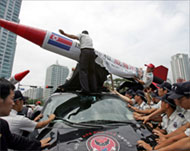UN approves N Korea sanctions
The UN Security Council has unanimously imposed mandatory targeted sanctions against North Korea over its recent missile tests after reaching a last-minute compromise with China.

But North Korea announced that it “totally rejects the resolution” within minutes of its adoption and vowed to conduct more missile tests in revenge for the Council action against it – the first since 1993.
Resolution 1695 condemning the July 5 launches sailed through after China dropped its reservation once a reference to Chapter Seven of the UN charter, which authorises tough wide-ranging sanctions or even military action, was dropped from the text.
It marked the end of days of agonising diplomatic wrangling that eventually saw Washington and its allies find a compromise with China and Russia over how to pose a united front against Kim Jong-Il’s regime.
John Bolton, US Ambassador to the UN, said the resolution “sends an unequivocal, unambiguous and unanimous message to Pyongyang: suspend your ballistic missile programme; stop your procurement of materials related to weapons of mass destruction.”
“We look forward to North Korea’s full, unconditional and immediate compliance with this resolution.”
Pressure
“We look forward to North Korea’s full, unconditional and immediate compliance with this resolution.” |
Taro Aso, the foreign minister of Japan – whose country had been lobbying together with Washington for strong global condemnation – hailed the unanimous vote. Taro Aso said in a statement that Tokyo “strongly urges” Pyongyang to heed the text.
Pak Gil Yon, the North Korea’s UN representative, condemned what he described as attempts by some countries to “misuse the Security Council for their despicable political aims” to isolate and put pressure on his country.
Pak said the North Korean Army would “go on with missile launch exercises” in the future as part of its efforts to bolster its military deterrent.
Bolton replied that this meant world powers needed to think about new sanctions.
“I think the fact that the North Koreans, within less than 45 minutes from the adoption of the resolution, have already rejected it, says in pretty clear terms just what they think of the concerns of the international community,” Bolton told CNN.
Vigilance
 |
|
N Korea says the missile tests are |
The text of the resolution “condemns” the seven missile tests – some of which landed in the Sea of Japan.
It “requires all member states, in accordance with their national legal authorities and legislation and consistent with international law, to exercise vigilance and prevent missile and missile related items, materials, goods and technology being transferred to (North Korea’s) missile or WMD (weapons of mass destruction) programmes.”
It also underlines the need for North Korea “to show restraint and refrain from any action that might aggravate tension” and to return to six-nation talks on resolving concerns over its nuclear and missile programme.
China and Russia had feared that punitive action against Pyongyang would further inflame tension in northeast Asia, setting back prospects for resuming six-party talks on getting North Korea to abandon its nuclear weapons programme in exchange for economic and security incentives.
North Korea, which declared last year that it had nuclear weapons, said it tested the missiles – including a new long-range Taepodong-2 that can theoretically reach American territory – to boost its defences in the face of US hostility.
George Bush, the US president, said North Korea was part of an “axis of evil” alongside Iran and Saddam Hussein’s Iraq.